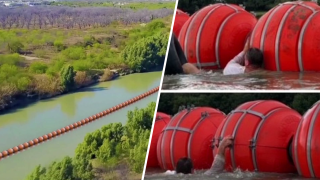
A floating barrier in the Rio Grande meant to discourage migrants from trying to cross from Mexico into Texas can stay for now, a full federal appeals court ruled Tuesday.
The 5th U.S. Circuit Court of Appeals' decision overturned a previous decision by a panel of the court. The ruling is the latest development in a standoff between Texas and President Joe Biden’s administration over immigration on the state’s 1,200-mile (1,930-kilometer) border with Mexico.
In December, a divided panel of the 5th Circuit had sided with a federal district judge in Texas who said the buoys must be moved. The entire appeals court on Tuesday said the court abused its discretion in granting the preliminary injunction.
The broader lawsuit in district court is set for a trial beginning on Aug. 6. The Biden administration accuses Texas of violating the federal Rivers and Harbor Act. Vanita Gupta, associate attorney general, said Texas “flouted federal law” and risks damaging U.S. foreign policy.
Get top local stories in DFW delivered to you every morning. Sign up for NBC DFW's News Headlines newsletter.
The series of linked, concrete-anchored buoys stretches roughly the length of three soccer fields in one of the busiest hotspots for illegal border crossings. The state installed it along the international border with Mexico between the Texas border city of Eagle Pass and Piedras Negras, Coahuila.
The Justice Department had asked a federal court to order Texas to remove the buoys, saying the water barrier poses humanitarian and environmental concerns along the international boundary. Texas Gov. Greg Abbott, a Republican, has waved off the lawsuit. He is cheered on by conservative allies who are eager for cases that would empower states to take on more aggressive immigration measures.
The barrier is one focal point in the legal disputes over border control between the Democratic president and Abbott. The Biden administration is also fighting for the right to cut razor-wire fencing at the border and for access to a city park at the border that the state fenced off.

